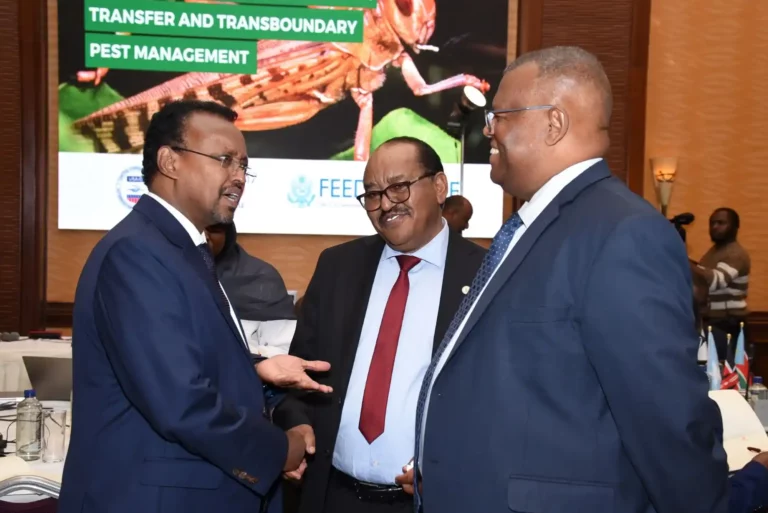The Intergovernmental Authority on Development (IGAD) held a regional ministerial meeting in Nairobi, Kenya, on 9th August 2023.
Its objective was to explore ways of improving risk transfer mechanisms and transboundary pest management in the region.
The meeting was facilitated by the Government of the United States of America and the World Bank.
The ministers expressed their concern over the region’s vulnerability to climate change and its effects on food security and livelihoods. They noted the high levels of food insecurity in the region, caused by various factors such as climate shocks, conflict and insecurity, and economic shocks.
The ministers reviewed the progress made since the previous IGAD ministerial meeting in October 2022, where they agreed on strategies to tackle food crises in the region. They reiterated their commitment to implement the strategies and to adopt proactive risk management approaches.
The ministers also addressed the challenges posed by transboundary pests such as desert locusts, fall armyworms and quelea birds, which have damaged crops and threatened food security in the region.
They recognized the efforts made by IGAD and its partners to contain and prevent the spread of these pests and urged for more cooperation and coordination among member states and stakeholders.
The ministers endorsed a set of recommendations to enhance risk transfer mechanisms and transboundary pest management in the region. These include:
- Developing and implementing national and regional policies and frameworks for risk transfer mechanisms such as insurance, social protection and contingency funds;
- Strengthening early warning systems and information-sharing platforms for climate-related risks and transboundary pests;
- Enhancing capacity building and technical support for risk assessment, analysis and management;
- Mobilizing resources and partnerships for risk transfer mechanisms and transboundary pest management;
- Promoting community-based approaches and best practices for risk reduction and resilience building.
Drought Disaster Resilience and Sustainability Initiative
The ministers praised the efforts of the IGAD Drought Disaster Resilience and Sustainability Initiative (IDDRSI) in increasing resilience investments in the region amid multiple hazards and acknowledged that they all have a role to play to ensure sustainable development, and hereby affirmed and resolved as follows:
- Declare their joint commitments to develop a comprehensive ‘roadmap’ that prioritizes the improvement of the region’s food systems, and the enhancement of resilience to the multi-dimensional risks and shocks that affect food security across the region to promote community, national and regional well-being and sustainable development across the region that contributes to peace;
- Urge IGAD to devise mechanisms that enhance the role of risk transfer and risk financing approaches in improving communities’ resilience and livelihoods;
- Further urge the adoption of innovative technologies, such as satellite monitoring systems and digital data collection tools for pests’ surveillance, monitoring and control operations and to increase access to microinsurance products and streamline processes;
- Recommend the IGAD governments and secretariat to develop supportive and synchronized policies and legal frameworks that recognize and promote the role of cooperatives in pastoral and agro-pastoral sectors;
- Appeal to IGAD member states and partners to accelerate investments in improving the resilience of the region’s food systems, recalling the previous commitment to strengthen the linkages between regional coordination mechanisms and the implementation of food systems’ national pathways, developed as a critical outcome of the Food Systems Summit;
The ministers expressed their appreciation to the Government of Kenya for hosting the meeting and to IGAD, the United States of America and the World Bank for their support.
They also thanked all participants for their constructive contributions and agreed to follow up on the implementation of the recommendations.




